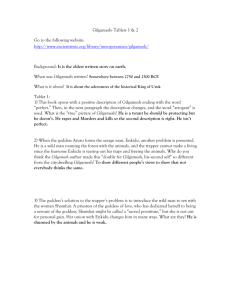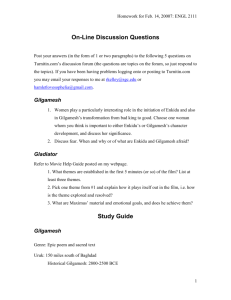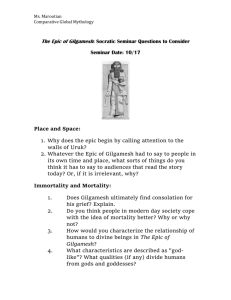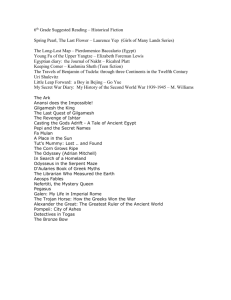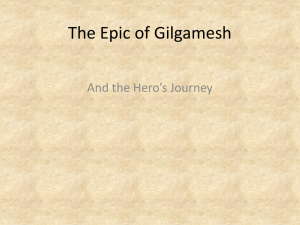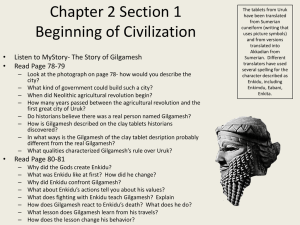Kristina Rutas - Comparative and World Literature
advertisement
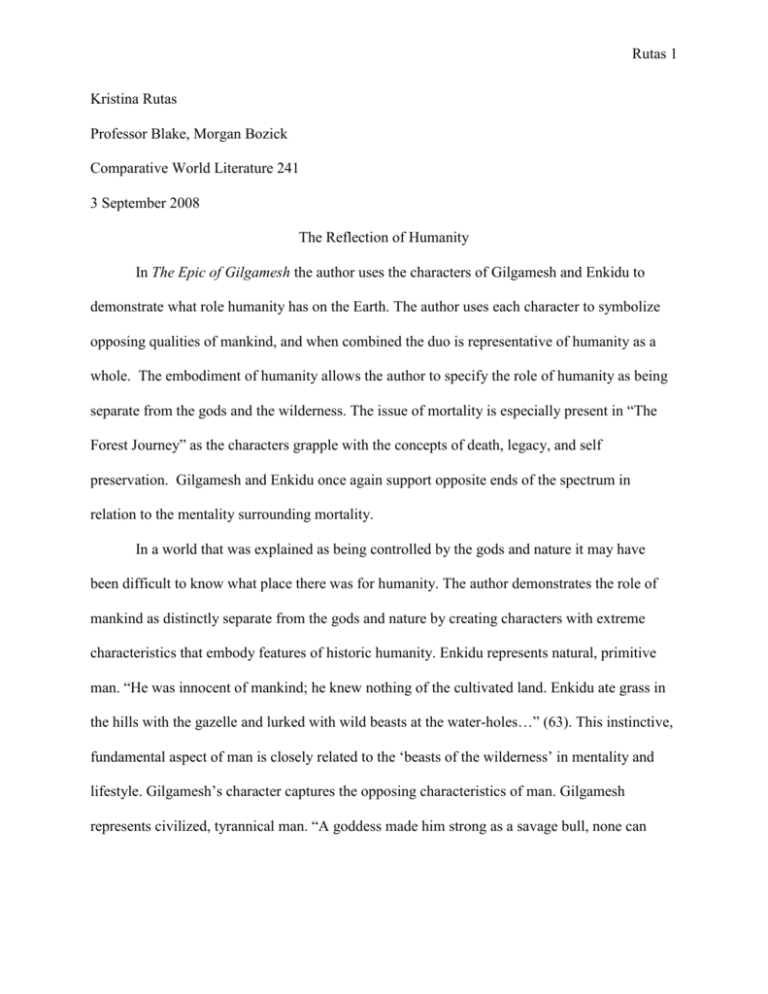
Rutas 1 Kristina Rutas Professor Blake, Morgan Bozick Comparative World Literature 241 3 September 2008 The Reflection of Humanity In The Epic of Gilgamesh the author uses the characters of Gilgamesh and Enkidu to demonstrate what role humanity has on the Earth. The author uses each character to symbolize opposing qualities of mankind, and when combined the duo is representative of humanity as a whole. The embodiment of humanity allows the author to specify the role of humanity as being separate from the gods and the wilderness. The issue of mortality is especially present in “The Forest Journey” as the characters grapple with the concepts of death, legacy, and self preservation. Gilgamesh and Enkidu once again support opposite ends of the spectrum in relation to the mentality surrounding mortality. In a world that was explained as being controlled by the gods and nature it may have been difficult to know what place there was for humanity. The author demonstrates the role of mankind as distinctly separate from the gods and nature by creating characters with extreme characteristics that embody features of historic humanity. Enkidu represents natural, primitive man. “He was innocent of mankind; he knew nothing of the cultivated land. Enkidu ate grass in the hills with the gazelle and lurked with wild beasts at the water-holes…” (63). This instinctive, fundamental aspect of man is closely related to the ‘beasts of the wilderness’ in mentality and lifestyle. Gilgamesh’s character captures the opposing characteristics of man. Gilgamesh represents civilized, tyrannical man. “A goddess made him strong as a savage bull, none can Rutas 2 withstand his arms” (63). Gilgamesh can be seen as representing god-like features of humanity because of his power and authority. Each character in his extreme is incomplete without the other. When Gilgamesh and Enkidu meet each other their qualities are countered and each is balanced. Together they create a whole and are resultantly demonstrative of the role of humanity on Earth. To Gilgamesh, Enkidu’s presence draws him down from his god-like, tyrannical stance. Gilgamesh is found asking what makes Enkidu sigh bitterly, and Enkidu replies that it is fatigue. “It was then that the lord Gilgamesh…reflected,” (67). Enkidu directs Gilgamesh’s awareness to his own mortality. To Enkidu, Gilgamesh is an equal that is able to satisfy his need for companionship above the beasts. “… [Enkidu] longed for a comrade, for one who would understand his heart” (65). Each man displays how humanity is different from the gods and nature upon meeting each other. Gilgamesh is introduced to the concept of mortality, the dividing line between the gods and man. Enkidu satisfies his own yearning for a companion, one that can understand the wisdom that man and not animal attain. The difference in how each man represents humanity translates to the difference in how each man perceives his mortality. Gilgamesh represents humanity’s desire for immortality by his wish to create or leave something that will outlast him. Gilgamesh states, “I am committed to this enterprise: to climb the mountain, to cut down the cedar, and leave behind me an enduring name,” (68). Gilgamesh plans to slaughter a monster named Humbaba in order to become a legend. Enkidu represents the natural instinct involving human mortality, the instinct of selfpreservation. Enkidu states, “O my lord, you do not know this monster and that is the reason you are not afraid. I who know him, I am terrified,” (72). Enkidu’s reluctance to embark on their journey shows his interest is stronger in self-preservation than in creating a legendary status. Rutas 3 The difference in the way that Gilgamesh and Enkidu perceive mortality may explain why a conflict arises over killing Humbaba. Upon hearing Humbaba plead for mercy Gilgamesh is tempted to spare the life of the beast, “…the heart of Gilgamesh was moved with compassion,” (73). Perhaps this is because Gilgamesh is satisfied by simply winning the battle and thus ensuring his name goes down in history. Whereas, to Enkidu leaving Humbaba alive means he is a threat and jeopardizes their survival. Enkidu states, “He [Humbaba] will bar the mountain road against you, and make the pathways impossible…this Humbaba must die,” (73). Understanding the difference in the way that the characters are aware of their mortality can explain why Enkidu, who is portrayed as a passive character, chooses an aggressive action. The pairing of Gilgamesh and Enkidu, and their journey to the Country of the Living provides a depiction of what the role of humanity is on Earth and what mortality means to this humanity. Gilgamesh and Enkidu are human beings, made supreme by their abilities which are embellished to reflect the qualities of mankind. The resulting reflection is of a humanity caught between the realm of nature and the god, a humanity coming to terms with the meaning of mortality.
